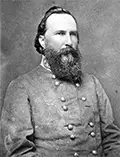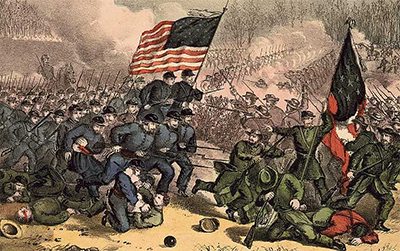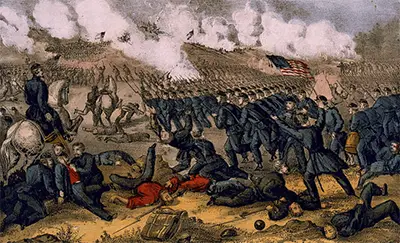Confederate General James Longstreet
James Longstreet was a Confederate general during the American Civil War. He was known as a skilled strategist and one of Robert E. Lee's most reliable commanders. 
He was born on Jan. 8, 1821, in the Edgefield District of South Carolina. He grew up on his parents' northeastern Georgia plantation until he was 9, when his father, also named James, sent him to Augusta, to live with his uncle, Augustus, and to further his education. Young James attended Richmond County Academy and entered the U.S. Military Academy in 1838. Longstreet was not a good student. He did graduate, in 1842, near the bottom of his class. Among the friends that he made at the Academy was a young Ohio cadet named Ulysses Grant. Longstreet exited West Point with a commission as a second lieutenant in the 4th U.S. Infantry, assigned to Jefferson Barracks, Mo. He served under Gen. Winfield Scott during the Mexican-American War, taking part in the siege of Veracruz and the assault on Mexico City, sustaining injury at the Battle of Chapultepec. His postwar military experience included stints at two Texas forts. When the Civil War began, he resigned his post as paymaster for the U.S. Army and signed up with the Alabama forces because a Congressman from that state had sponsored his entry into West Point. Longstreet joined the Confederate Army, entering as a lieutenant colonel. After meeting with Confederate President Jefferson Davis, Longstreet found himself promoted to brigadier general and assigned to the troops of Gen. P.G.T. Beauregard at Manassas, Va. Longstreet commanded a brigade of Virginia troops who fought in the First Battle of Bull Run/Manassas and earned a promotion to the rank of major general and a spot as a division commander in the Army of Northern Virginia. Longstreet had mixed success during the defense of Virginia in the wake of the Peninsula Campaign prosecuted by Union Gen. George McClellan. When Robert E. Lee assumed command of the Army of Northern Virginia, Longstreet increased his command role, seeing success during the Battle of the 7 Days, which effectively convinced McClellan to abandon his march on Richmond. 
Longstreet's next success came at the Second Battle of Bull Run/Manassas, when his soldiers delivered a devastating flanking attack that convinced the Army of Virginia to leave the field of battle. Marching with Lee in the invasion of Maryland, Longstreet was one of the few to have success in the Confederate defeat at South Mountain and then at Antietam/Sharpsburg. Lee rewarded Longstreet with a promotion to lieutenant general. A strong believer in the power of defensive positioning, especially given the Confederacy's numerical inferiority, Longstreet excelled in this strategy Directly after the Confederate victory at Fredericksburg, Lee sent Longstreet and a contingent of his crops on a supply run to Suffolk; thus, they did not take part in the next Confederate victory, at Chancellorsville. Returning to the fold, Longstreet urged Lee to move west to Tennessee, to stem the tide of Union victories there. Lee overruled this recommendation and, instead, ordered another invasion of the North. A reluctant Longstreet led his men into Pennsylvania and followed orders at the iconic Battle of Gettysburg. Next page > Defeat and Mixed Legacy > Page 1, 2 |
|
Social Studies for Kids
copyright 2002–2024
David White



 at the next prominent battle between the Union and the Confederacy in Virginia. The new Union commander,
at the next prominent battle between the Union and the Confederacy in Virginia. The new Union commander, 

